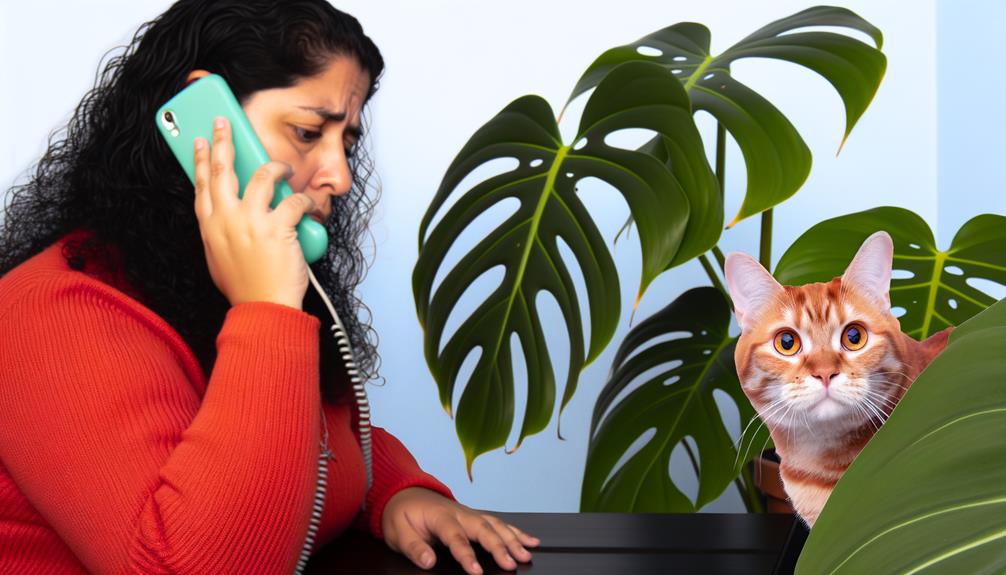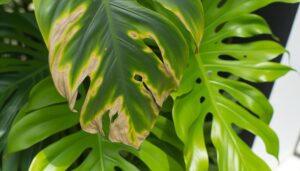What Should I Do if My Cat Ate My Monstera Deliciosa?
If your cat consumed your Monstera Deliciosa, begin by observing for symptoms such as drooling, vomiting, and difficulty swallowing. Assess the situation calmly and see if your cat appears lethargic.
It is crucial to check for any remaining plant fragments that could pose a threat to your cat. Provide fresh water to help flush out toxins and closely monitor your cat's behavior.
Refrain from trying home remedies, as they might exacerbate the situation. Reach out to your vet immediately for professional advice.
It is vital to prevent future incidents by placing toxic plants out of reach. You will discover more detailed steps on how to handle this situation next.

Key Takeaways
- Remove any remaining plant fragments and ensure no soil or stem pieces are left behind.
- Offer your cat fresh water immediately to aid in toxin elimination.
- Monitor for symptoms like drooling, vomiting, and difficulty swallowing, and note any behavioral changes.
- Contact your veterinarian immediately and describe the situation accurately for professional guidance.
- Avoid home remedies and follow the vet's instructions closely to ensure safe recovery.
Recognize the Symptoms
If your cat has ingested Monstera Deliciosa, watch for symptoms like drooling, vomiting, and difficulty swallowing. These signs can appear quickly and are crucial indicators of distress.
Additionally, your cat might exhibit pawing at its mouth, decreased appetite, and overall lethargy. The Monstera plant contains insoluble calcium oxalates, which can cause irritation and swelling in your cat's mouth, throat, and gastrointestinal tract.
It's vital to stay calm and closely monitor your cat's behavior. Look for any changes in vocalization, excessive paw licking or scratching, and signs of respiratory distress. Understanding these symptoms guarantees you're better prepared to act swiftly, providing your cat with the timely care it needs.
Always prioritize your cat's well-being and seek professional advice when in doubt.
Assess the Situation
Once you've recognized the symptoms, it's important to assess the situation to determine the severity of your cat's condition. First, evaluate the symptoms' intensity. Mild symptoms might include drooling, pawing at the mouth, and minor gastrointestinal upset. More severe symptoms, such as significant swelling, difficulty breathing, or excessive vomiting, require immediate attention.
Observe your cat's behavior closely—if your cat seems lethargic or in distress, it's essential to act quickly. Also, try to estimate how much Monstera Deliciosa your cat ingested, as larger amounts could lead to more severe reactions. Keeping calm will help you better assess your cat's condition and make necessary decisions. Understanding the situation helps you provide the best care for your furry friend.
Remove Plant Fragments
Carefully inspect your home for any remaining leaves or stem pieces that your cat might've missed. Be thorough in checking around the plant and other areas where your cat tends to roam.
Don't forget to discard any fallen soil to prevent further ingestion.
Inspect for Remaining Leaves
Start by thoroughly examining the area around your Monstera Deliciosa to identify and remove any plant fragments that might still be accessible to your cat. This step is vital to prevent further ingestion of the toxic plant. Carefully look for:
- Scattered leaves: Check the floor and surrounding surfaces for any fallen leaves.
- Small stem pieces: Tiny fragments can easily be overlooked, so be meticulous.
- Soil debris: Sometimes, leaves or plant parts get mixed with the soil.
Removing these fragments helps secure your cat won't ingest more of the plant. Be methodical and patient, as even small remnants can be harmful.
Your vigilance can make a significant difference in keeping your feline friend safe and healthy.
Check for Stem Pieces
Scan the area around your Monstera Deliciosa to locate and remove any remaining stem pieces that could pose a risk to your cat.
Carefully check under furniture, around the plant pot, and in surrounding nooks and crannies. Cats are naturally curious and might find even the smallest plant fragments.
Use a vacuum or a handheld broom to make sure no tiny pieces are left behind. Stem pieces can be just as harmful as leaves or berries, containing the same toxic substances.
Discard Fallen Soil
After verifying no stem pieces remain, focus on discarding any fallen soil that may contain harmful plant fragments. Soil can harbor small pieces of Monstera Deliciosa that your cat might ingest, so take care to clean thoroughly. Use a dustpan and brush to sweep up the soil and dispose of it securely.
- Vacuum the area: Confirm no tiny fragments are left behind.
- Wipe surfaces: Use a damp cloth to clean surfaces where soil might've settled.
- Inspect surroundings: Look under furniture and around the plant for any missed soil or plant pieces.
Provide Fresh Water
Ensuring your cat has access to fresh water immediately can help flush out any toxins they may have ingested from the Monstera Deliciosa. Fill a clean bowl with fresh water and place it where your cat can easily reach it.
This step is vital because water can aid in diluting the harmful substances and promoting their elimination through urine. Encourage your cat to drink by gently guiding them to the water bowl or even using a dropper if they're hesitant.
Keep an eye on the water level, ensuring it remains clean and abundant. This proactive measure can significantly reduce the risk of severe symptoms, providing an important first line of defense for your cat's health.
Monitor Your Cat
Monitoring your cat closely after they ingest Monstera Deliciosa is crucial. Watch for symptoms like drooling, difficulty swallowing, or lethargy, and check for any signs of vomiting.
Also, keep an eye on their eating habits to make sure they're still interested in food.
Watch for Symptoms
Keep a close eye on your cat for any signs of discomfort or unusual behavior. Monstera Deliciosa can be toxic, and early detection of symptoms is vital. Look for changes that might indicate your cat is in distress.
- Drooling: Excessive saliva can be a sign of irritation.
- Lethargy: A sudden drop in energy levels may indicate your cat isn't feeling well.
- Pawing at the mouth: This could signal oral discomfort or pain.
Being vigilant helps you catch potential issues early. If you notice any of these symptoms, it's crucial to act quickly. Your cat's health and well-being depend on your timely response. Remember, your observation can make a significant difference in the outcome.
Check for Vomiting
One significant sign to watch for is vomiting, which can indicate your cat's body is reacting to the Monstera Deliciosa. If your cat begins to vomit, it's essential to monitor the frequency and severity.
Vomiting is the body's way of expelling toxins, so this can be a clear sign that something isn't right. Keep a close eye on your cat and note any other accompanying symptoms like drooling or lethargy.
It's also important to make sure your cat stays hydrated. If the vomiting persists or becomes severe, don't hesitate to contact your veterinarian immediately. They can provide guidance on the next steps and whether further medical intervention is necessary.
Your attentiveness can make a significant difference in your cat's recovery.
Observe Eating Habits
Pay close attention to any changes in your cat's eating habits, as this can be an early indicator of distress. If your cat stops eating or shows a reduced appetite, it could be a sign of discomfort or a reaction to ingesting the Monstera Deliciosa.
Monitor your cat closely for the following signs:
- Decreased Appetite: Noticeable reduction in the amount of food your cat consumes.
- Difficulty Swallowing: Struggling or hesitation when trying to eat or drink.
- Unusual Eating Patterns: Eating slower than usual or avoiding food altogether.
Be empathetic and patient while monitoring these behaviors. Document any changes and consult your vet promptly if the symptoms persist. Your vigilance can make a significant difference in your cat's recovery and overall health.
Contact Your Vet
Get in touch with your vet immediately to discuss the potential risks and necessary steps after your cat's ingestion of Monstera Deliciosa. The plant contains calcium oxalate crystals, which can cause severe discomfort and health issues for your feline friend. Time is essential, so don't delay.
| Action | Reason |
|---|---|
| Call the vet | Immediate professional advice |
| Describe the situation | Accurate assessment |
| Follow instructions | Minimize health risks |
Your vet will likely ask about the amount ingested and any symptoms observed. They'll guide you on whether to bring your cat in for an examination or if treatment at home is sufficient. Acting promptly can prevent complications and guarantee your cat receives the care they need.
Describe Symptoms Clearly
You'll need to watch for common toxicity symptoms like drooling, vomiting, and difficulty swallowing. Pay attention to any immediate behavioral changes, such as lethargy or hiding.
Signs of gastrointestinal distress, including diarrhea or loss of appetite, also indicate that your cat may have ingested something harmful.
Common Toxicity Symptoms
If your cat has consumed Monstera Deliciosa, you may observe symptoms like excessive salivation, throwing up, and challenges in swallowing. These indications can be worrisome for both you and your pet. Recognizing these signs promptly is crucial to take appropriate action.
- Excessive salivation: Your cat may begin to excessively drool, which can clearly indicate irritation.
- Throwing up: This is the body's natural way to expel the harmful substance and may happen shortly after ingestion.
- Challenges in swallowing: Your cat may seem to choke or struggle with eating and drinking, signaling discomfort in the throat.
Being aware of these symptoms helps you respond swiftly and ensures your cat gets the necessary care. Always seek advice from your vet if you notice these signs.
Immediate Behavioral Changes
You might notice your cat acting unusually restless or displaying sudden changes in behavior after ingesting Monstera Deliciosa. These changes can be alarming, but recognizing them early is essential. Your cat may exhibit symptoms such as excessive drooling, pawing at the mouth, or vocalizing discomfort. Behavioral changes might also include hiding or seeking attention more than usual. Below is a table summarizing these immediate behavioral changes:
| Symptom | Description | Action to Take |
|---|---|---|
| Restlessness | Increased movement, agitation | Monitor closely |
| Drooling | Excessive saliva production | Clean mouth gently |
| Pawing at Mouth | Rubbing face with paws | Check for swelling |
| Vocalizing Discomfort | Unusual meowing or crying | Comfort and observe |
Being observant and empathetic can help your cat feel more secure during this unsettling time.
Gastrointestinal Distress Signs
Some common signs of gastrointestinal distress in cats after ingesting Monstera Deliciosa include vomiting, diarrhea, and loss of appetite. You might notice these symptoms soon after your cat has chewed on the plant. Observing your cat closely and noting any changes in their behavior or physical state is crucial.
Here's what you might see:
- Vomiting: Your cat may regurgitate food or clear fluids.
- Diarrhea: Frequent, loose, or watery stools can occur.
- Loss of appetite: Your cat might show disinterest in eating.
These symptoms can be distressing for both you and your pet. If you observe any of these signs, it's important to contact your veterinarian for further guidance and support.
Follow Vet Instructions
After contacting your veterinarian, make sure to adhere closely to their instructions to guarantee your cat's safe recovery. Follow the prescribed medication schedule, monitor your cat's symptoms, and provide a comfortable resting environment. Your vet knows best, so it's important to maintain clear communication and update them on any changes.
Here's a quick guide to help you stay organized:
| Action | Emotion | Importance |
|---|---|---|
| Administering medication | Anxiety about proper dosing | Ensures treatment effectiveness |
| Monitoring symptoms | Concern over health changes | Early detection of issues |
| Providing comfort | Empathy for your cat's pain | Promotes faster recovery |
Sticking to the vet's plan will give your cat the best chance to bounce back quickly and safely.
Avoid Home Remedies
Relying on home remedies can pose serious risks to your cat's health, as many common household substances may exacerbate symptoms or cause additional harm. When your cat ingests Monstera Deliciosa, you might feel compelled to try quick fixes, but this can be dangerous.
Consider these potential pitfalls:
- Milk: Often believed to neutralize toxins, but it can actually cause digestive issues in cats.
- Hydrogen Peroxide: Used to induce vomiting in dogs, but it's not safe for cats and can cause severe irritation.
- Human Medications: Over-the-counter drugs like antihistamines or pain relievers can be toxic to pets.
Your best course of action is always to consult a veterinarian. They're equipped with the knowledge and resources to provide the safest and most effective care.
Prevent Future Incidents
To safeguard your cat doesn't face another perilous encounter with your Monstera Deliciosa, implement a few preventive measures around your home.
First, place the Monstera in an inaccessible area, such as a high shelf or a room your cat can't enter.
You might also consider using deterrents like citrus sprays or double-sided tape on plant pots to discourage your cat from approaching.
Additionally, guarantee your cat has plenty of safe toys and scratching posts to keep them entertained and distracted.
Regularly inspect your home for any accessible toxic plants and remove or relocate them promptly.
Safe Plant Alternatives
Consider incorporating non-toxic plants like spider plants, Boston ferns, or areca palms to secure your home remains both cat-friendly and aesthetically pleasing. These alternatives not only provide a safe environment for your feline friend but also enhance your living space with lush greenery.
Here are some great options:
- Spider Plants: These hardy plants are easy to care for and can flourish in various light conditions.
- Boston Ferns: Known for their air-purifying properties, they add a touch of elegance to any room.
- Areca Palms: These tropical beauties create a serene ambiance and are safe for cats.
Choosing these plants secures your pet's safety without compromising your home's aesthetic. Your cat can explore freely while you enjoy a beautiful, toxin-free environment.
Emergency Kit Essentials
Do you know what items should be in your emergency kit if your cat eats something toxic like a Monstera Deliciosa?
First, have activated charcoal on hand; it can help absorb toxins.
Keep a bottle of hydrogen peroxide, which may induce vomiting if advised by a vet.
Stock some saline solution to rinse your cat's mouth and eyes.
A digital thermometer is vital for monitoring your cat's temperature.
Include a pair of gloves, a soft towel, and a pet carrier for safe transport.
Always have the contact details of your vet and a 24/7 emergency animal clinic readily available.
An emergency kit can make a significant difference in ensuring your cat gets the prompt care it needs.
Conclusion
If your cat ate your Monstera Deliciosa, you might worry it's overreacting, but it's vital to act swiftly. Recognize symptoms, remove plant fragments, and offer fresh water.
Monitor your cat closely and avoid home remedies. Prevent future incidents by choosing safe plant alternatives. An emergency kit is critical for peace of mind.
Your quick, informed response can make all the difference in ensuring your furry friend's safety and well-being.






